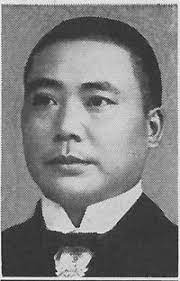Teng Hsi-hou (1889-30 March 1964), Szechwanese militarist who in 1936 became the first independent commander in that province to hand over his defense area to the National Government authorities. During the Sino- Japanese war he commanded the Fourth and the Twenty-second Group armies. He governed Szechwan in 1946-47. In 1949 he declared allegiance to the Chinese Communists.
Jungshan hsien, Szechwan, was the birthplace of Teng Hsi-hou. He received his education at the Szechwan Army Primary School, the Nanking Army Middle School, and the Paoting Military Academy. Upon graduation from Paoting in 1912, he returned to Szechwan to become a training officer under Liu Tsun-hou. He rose steadily in the Szechwan forces, becoming a regimental commander. In 1916 he participated in the campaign against Yuan Shih-k'ai which resulted in the declaration of Szechwan's independence. When Liu Tsun-hou became military governor of Szechwan in 1917, he elevated Teng to the rank of brigadier general and appointed him commissioner for purging the countryside. After Hsiung K'o-wu (q.v.) ousted Liu Tsun-hou and assumed office as military governor, Teng served with the forces of Liu Ch'eng-hsun. In 1920 he received command of the 6th Division, with the concurrent post of Shunking-Suiting garrison commander.
About 1921 Teng Hsi-hou took command of the 3rd Division. The following year, he joined with such leaders as Liu Ch'eng-hsun, Tan Mou-hsin, Lai Hsin-hui, T'ien Sung-yao, and Liu Pin in driving Yang Sen and Liu Hsiang (qq.v.) out of Szechwan. In February 1923, however, Teng came into conflict with Liu Ch'eng-hsun and aided the return of Liu Hsiang and Yang Sen to Szechwan. Ts'ao K'un (q.v.) appointed Teng civil governor of Szechwan in May 1924. He took part in an attempt to unseat Yang Sen as military rehabilitation comissioner in March 1925, but formed an alliance with Yuan Tsu-ming in February 1926 to support Yang's return to power. In May of that year Wu P'ei-fu (q.v.) appointed Yang Sen civil governor of Szechwan, with Teng as military governor and Yuan Tsu-ming as Szechwan-Kweichow defense commissioner.
At the end of 1926 Teng Hsi-hou, like Yang Sen, decided to declare allegiance to the Nationalists, and in 1927 they sided with Chiang Kai-shek against the Nationalist regime at Wuhan. After serving as commander of the Twenty-eighth Army of the National Revolutionary Army, in late 1927 Teng became a member of the Military Affairs Commission at Nanking and commander in chief of the Seventh Route Army.
On 31 October 1 928 the new National Government at Nanking appointed Teng Hsi-hou commissioner of civil affairs in the reorganized Szechwan provincial government headed by Liu Wen-hui (q.v.). He also became deputy chairman, under Liu Hsiang, of the Szechwan- Sikang military reorganization commission. He assumed these posts in the spring of 1929. In the autumn of 1932 he joined with Liu Hsiang and Yang Sen in a campaign to unseat Liu Wen-hui. By October 1933 Liu Wen-hui had been driven into Sikang. Liu Hsiang assumed office as governor of Szechwan in 1934. In 1935, when the Communist Long March forces threatened the stability of Szechwan, Liu Hsiang assumed the concurrent post of peace preservation commissioner, and Teng received command of the Forty-fifth Army and took the field as commander of the First Route of the Szechwan Bandit-Suppression Army. The following year, Teng became the first semündependent Szechwanese militarist to hand over his defense area to the National Government authorities, thus aiding the National Government's effort to strengthen its influence in Szechwan. For this action, he received the rank of full general and the Cloud and Banner decoration. He also received command of the Sixth Route Army.
Soon after the Sino-Japanese war began in July 1937, Teng Hsi-hou's army was redesignated the Fourth Group Army and was sent to the Shansi front. It later was transferred to the Hsuchow-Haichow front, where it performed brilliantly in the battle at Tenghsien in March 1938. That month, Teng was appointed commander of the Twenty-second Group Army and pacification commissioner for Szechwan and Sikang. He held those posts for the rest of the war. In 1946 he was named acting governor of Szechwan, and he was confirmed as governor in May 1947. He assumed the office on 2 June, but was removed from it in April 1948 on charges of misappropriating funds. At that time he was appointed pacification commissioner for the Szechwan-Shensi-Kansu area.
As the Nationalists were preparing to abandon Szechwan, their last stronghold on the Chinese mainland, to the Chinese Communists in December 1949, Teng Hsi-hou and Liu Wen-hui declared allegiance to the Communists. Teng subsequently became a member of the Southwest Military and Administrative Committee. He later held such posts in the People's Republic of China as vice chairman of the Szechwan provincial government, central committee member of the Kuomintang Revolutionary Committee, delegate to the National People's Congress, and member of the National Defense Council. He died at Chengtu on 30 March 1964, at the age of 75.

邓锡候
字:晋康
邓锡候(1889—1964.3.30),四川军阀,1936年,他成为割地自据的四川军事指挥官中将自己的防地交给国民政府当局的第一人。中日战争时曾任第四军团长,第二十二集团军总司令。1949年向中国共产党投诚。
邓锡候是四川营山县人,曾在四川讲武堂、南京陆军中学堂、保定军官学校接受教育。1912年毕业于保定军校后回四川在刘存厚手下任教官。他在川军中稳步上升,当上了团长。1916年参加反袁斗争,当时四川宣布独立。1917年刘存厚任四川督军,提升邓锡候为准将清乡督办。熊克武驱走刘存厚任督军后,邓在刘成勋手下任职,1920年任第六师师长兼顺遂镇守使。
1921年,邓任三师师长,翌年,他和刘成勋、但懋辛、赖心辉、田颂尧、刘斌一起驱逐杨森、刘湘出四川°1923年2月,邓又与刘成勋冲突,劝刘湘、杨森回四川。1924年5月,曹锟任邓为四川省长。1925年3月他参加解除杨森善后督办之举,但于1926年2月又与袁祖铭联合支持杨森上台。同年5月,吴佩孚任杨森为四川省长,邓为督军,袁祖铭为川黔边防督办。
1926年底,邓和杨森一样决定效忠国民党。1927年他们与蒋介石一起反对武汉国民政府。邓任国民革命军二十八军军长后,于1927年底成为南京军事委员会委员和第七路军总指挥。
1928年10月31日南京国民政府任命邓为以刘文辉为省长的改组后的四川省政府的政务厅长,并在刘湘手下任川康编遣处副主任。他于1929年春就任这些职务。1932年秋,他和刘湘、杨森一超驱逐刘文辉,刘文辉于1933年10月披赶到西康。1934年刘湘任四川省主席。1935年共产党长征部队威胁四川的稳定局面时,刘湘兼任绥靖主任,邓任四十五军军长,四川剿匪军一路军司令。1936年,邓成为半独立的四川军阀中将其防区交给国民党政府当局的第一人,此举使国民政府能加强其在四川的彩响,他同时被递升为上将,获得青天白日勋章,并任第木路军总指挥。
1937年7月中日战争开始后,邓任第四军团长,开赴山西前线,后又调往徐海前线,在1938年3月滕县之战中表现出色。是月,邓任第二十二集团军总司令、川康绥靖公署主任。他在整个战争期间一直担任这些职务。1946年代理四川省主席,1947年5月成为省主席,他于6月2日就任,后因被控分配军饷不均,于1948年4月去职,以后被任命为川陕甘绥悄公署主任。
1949年12月,国民党准备将四川这个在中国大陆的最后据点放弃给共产党时,邓和刘文辉宣布起义,向共产竟投诚。此后邓成为西南军政委员会委员,以后在中华人民共和国担任四川省副省长,国民党革命委员会中央委员,全国人民代表大会代表,国防委员会委员。1964年3月30日在成都去世,年七十五岁。